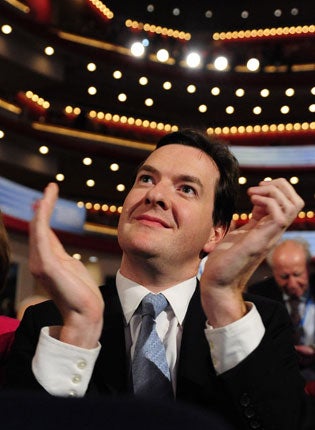Chancellor: we are still on side of middle-class aspiration

Your support helps us to tell the story
From reproductive rights to climate change to Big Tech, The Independent is on the ground when the story is developing. Whether it's investigating the financials of Elon Musk's pro-Trump PAC or producing our latest documentary, 'The A Word', which shines a light on the American women fighting for reproductive rights, we know how important it is to parse out the facts from the messaging.
At such a critical moment in US history, we need reporters on the ground. Your donation allows us to keep sending journalists to speak to both sides of the story.
The Independent is trusted by Americans across the entire political spectrum. And unlike many other quality news outlets, we choose not to lock Americans out of our reporting and analysis with paywalls. We believe quality journalism should be available to everyone, paid for by those who can afford it.
Your support makes all the difference.The Chancellor will today try to reassure middle-class families steeling themselves for the loss of benefits that the Coalition Government is still on the side of aspiration.
George Osborne will also seek to rebut accusations that ministers are focusing too narrowly on cutting spending by promising to invest in transport, the environment and skills. But he will make clear the financial pain about to hit the country, with a warning to the Tory conference that any delay to his plans for a massive squeeze on spending will only pile up bigger future bills.
David Cameron yesterday indicated that some universal allowances – such as child benefit – could be scrapped for wealthier families. Despite the austerity message, the Chancellor will pledge to release the "aspirations of the whole British people", arguing that the foundations of a strong economy depend on encouraging the "aspiration to have a better life, to get a better job, to give your children a better future".
The remarks are partly aimed at drawing a dividing line with the new Labour leader, Ed Miliband, who has argued that his party needs to do more to reconnect with its core working-class supporters. Although he is about to cut £83bn from spending over four years, Mr Osborne will promise to invest in projects that foster economic growth. Money will be found for transport schemes, medical research, developing communications networks and boosting skills, as well as environmental friendly projects.
He will hit back at Mr Miliband's accusation that the speed and scale of the planned cuts could tip Britain back into recession, likening Britain's £109bn structural deficit to a credit card debt. "The longer you leave it, the worse it gets," he will tell the conference in Birmingham.
"You pay more interest. You pay interest on the interest. You pay interest on the interest on the interest. We are already paying £120m of interest every single day thanks to the last Labour government. Delay now means pay more later. Everyone knows it's the most basic rule of debt. So Labour's cuts wouldn't be smaller. They would be bigger and last longer."
Mr Cameron yesterday suggested it was no longer "affordable" to continue paying some universal benefits to better-off families as he confirmed that ministers had reached an outline deal on overhauling the welfare system.
Iain Duncan Smith, the Work and Pensions Secretary, has won support for moves to replace the complex array of benefits into a single payment.
Ministers are still negotiating over where savings can be made to cover the estimated £3bn-plus cost of getting the new system off the ground.
Much of their attention is focused on universal payments, such as child benefit and the winter fuel allowances paid to pensioners. Mr Cameron told the BBC: "We have got to ask – are there some areas of universal benefits that are no longer affordable?"
Ministers are examining whether child benefit, which covers some children up to the age of 19 if they stay in education or training, should strictly only apply to under-16s – a potential saving of £2bn. Alternatively, the benefit could be means-tested to target it on needier households, depriving middle-class families of payments worth more than £1,000 a year.
Join our commenting forum
Join thought-provoking conversations, follow other Independent readers and see their replies
Comments